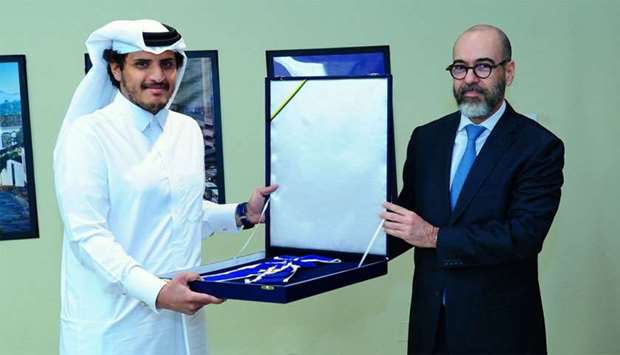The Brazilian government, through its embassy in Doha, has awarded the Order of Rio Branco to Al Wabra Wildlife Preservation on Sunday for helping preserve, breed, and save the Brazilian ‘little blue macaw’ from extinction.
The species, also known as the Spix’s macaw, was popularised by animated film ‘Rio’ in 2011 and has been considered officially extinct in the wild since 2000.
But today, about 130 of these birds are being taken care of in private institutions in Qatar, Germany and Brasil where they have been able to breed and multiply in safety.
“We are very proud and honoured to say that this is the very first time that the Brazilian government bestowed such award to a Qatari institution. We have already awarded some Qatari citizens but not a Qatari organisation,” said Brazilian ambassador Roberto Abdalla who handed over the award to Sheikh Hamad bin Saoud al-Thani, who owns Al Wabra.
This institution was established in central Qatar by his father, Sheikh Saoud bin Mohamed bin Ali al-Thani who transformed it into a world-renowned research and conservation centre.
The facility breeds various types of animal species such as macaws, birds of paradise, wild cats, and wild equine species, among others.

The Spix’s macaw, popularised by animated film ‘Rio’ in 2011, is considered as “the most threatened species kept at Lubara and one the rarest animals on earth.”
“The honour bestowed is a recognition not only for the valuable work Al Wabra has done for saving the Brazilian blue macaw from extinction, but also for its continued and unwavering effort in raising public awareness of wildlife preservation and the importance of reintroducing endangered species to the wild,” added the envoy, who was speaking at the event, which was attended by dignitaries, diplomats and guests.
The Order of Rio Branco, established by the Brazilian government on February 5, 1963, is a commendation given annually by the Ministry of Foreign Affairs of Brazil to its citizens and foreign nationals, as well as entities, for their outstanding contribution to the nation and the promotion of its international relations.
A partnership between Al Wabra and Brazil’s Ministry of Environment in 2016, along with other national and international organisations, significantly aided in preserving and breeding this species, Abdalla recalled.
He noted that such technical co-operation backed the mission done by the ‘Brazilian National Action for the Blue Macaw’, the Chico Mendes Institute for Biodiversity Conservation, and the Fazenda Cachoeira – a local farm with expertise in the breeding of the macaw.
The agreement also formed international partnerships with the Lubara Breeding Centre at the Al Wabra farm in Qatar; the Association for the Conservation of Extinct Parrots in Germany – which have specimens and technology for the reproduction of the species; the Parrots International, a New Zealand-based breeding enterprise; and the Jurong Bird Park in Singapore.
“The biggest achievement of this project is the preservation, these animals were considered extinct,” Abdalla said. “They saved these animals from extinction and this is the most beautiful and most remarkable thing that they have done.”
Al Wabra started breeding with three to four pairs of blue macaw and the numbers grew significantly, said Sheikha Sarah Saoud al-Thani, co-owner of Al Wabra.
“The next step right now is to release the birds in the wild, and we will pair and reintroduce them in their natural caatinga habitat (in the northeast region of Brazil),” she said.
Sheikh Saoud secured 2,223 hectares of land (Concordia farm) in Curaca, Brazil, to enable the successful re-establishment of Spix’s macaw.
According to Sheikha Sarah, the project achieved a breakthrough two years ago after breeding the species naturally without incubation and artificial insemination.
According to Al Wabra, the Spix’s macaw is considered as “the most threatened species kept at Lubara and one the rarest animals on earth.”
The Lubara Breeding Centre at the Al Wabra farm
Apart from the Spix’s macaw, the Lubara Breeding Centre at the Al Wabra farm in Qatar is also home to some 2,000 animals of 90 different species, many of whom are threatened or endangered.
This Qatari institution aims to be a leader globally in education, research and conservation of endangered animals and their habitats.
Some of these animals include the Lear’s macaw, which is endemic to northeastern Brazil and has a small wild population of about 75 to 1,000 birds; six different species of ‘birds of paradise’, including two distinct sub-species of the ‘Greater Bird of Paradise’; the Phillip’s Dikdik, one of the smallest antelopes on earth; Somali wild ass, known as the most endangered wild equid worldwide; and Beira antelope, a heat sensitive species, which needs air conditioned quarters in the hot Qatar summers; among others.
Lubara is also among the few breeding facilities in the world, which can successfully breed the Spix’s macaw.
Some of these centres include the Association for the Conservation of Extinct Parrots in Germany, which has specimens and technology for the reproduction of such species; Parrots International, a New Zealand-based breeding enterprise; as well as the Jurong Bird Park in Singapore.


